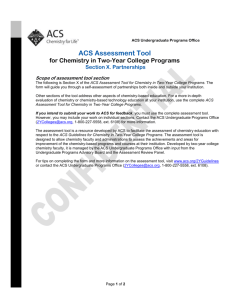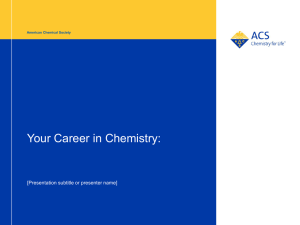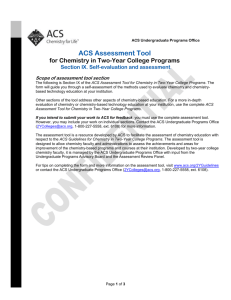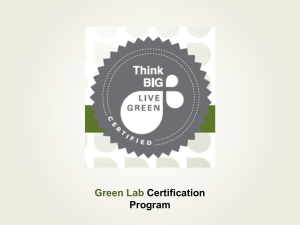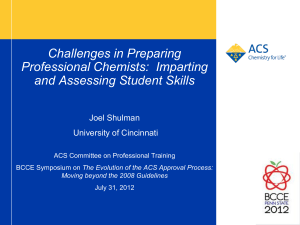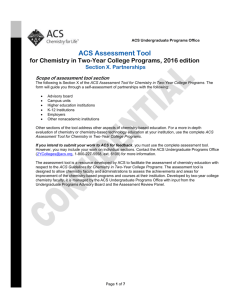VIII. Student Academic Counseling, Career Advising, and Mentoring
advertisement
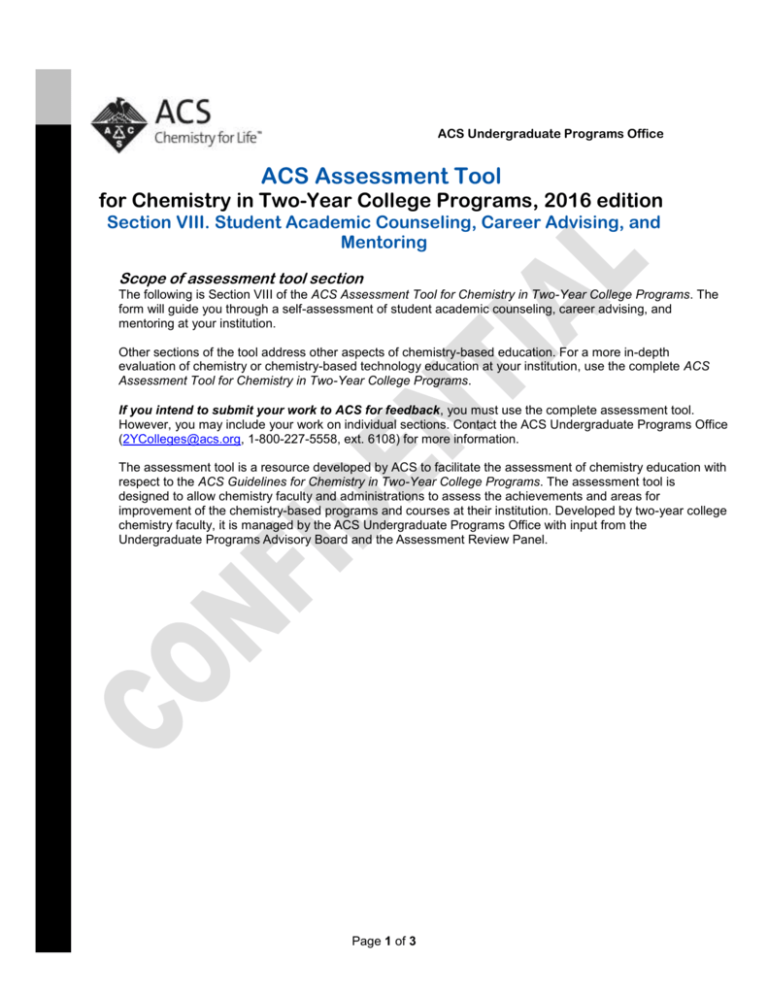
ACS Undergraduate Programs Office ACS Assessment Tool for Chemistry in Two-Year College Programs, 2016 edition Section VIII. Student Academic Counseling, Career Advising, and Mentoring Scope of assessment tool section The following is Section VIII of the ACS Assessment Tool for Chemistry in Two-Year College Programs. The form will guide you through a self-assessment of student academic counseling, career advising, and mentoring at your institution. Other sections of the tool address other aspects of chemistry-based education. For a more in-depth evaluation of chemistry or chemistry-based technology education at your institution, use the complete ACS Assessment Tool for Chemistry in Two-Year College Programs. If you intend to submit your work to ACS for feedback, you must use the complete assessment tool. However, you may include your work on individual sections. Contact the ACS Undergraduate Programs Office (2YColleges@acs.org, 1-800-227-5558, ext. 6108) for more information. The assessment tool is a resource developed by ACS to facilitate the assessment of chemistry education with respect to the ACS Guidelines for Chemistry in Two-Year College Programs. The assessment tool is designed to allow chemistry faculty and administrations to assess the achievements and areas for improvement of the chemistry-based programs and courses at their institution. Developed by two-year college chemistry faculty, it is managed by the ACS Undergraduate Programs Office with input from the Undergraduate Programs Advisory Board and the Assessment Review Panel. Page 1 of 3 ACS Assessment Tool for Chemistry in Two-Year College Programs, 2016 edition VIII. Student Academic Counseling, Career Advising, and Mentoring (See Section 8 of the ACS Guidelines for Chemistry in Two-Year College Programs, p. 29-31.) 1. Who is responsible for academic counseling, career advising, and student mentoring on your campus? (Select all that apply.) Academic counseling Career advising Student mentoring ☐ Trained counselors ☐ Trained counselors ☐ Trained counselors ☐ Chemistry faculty, with ☐ Chemistry faculty, with ☐ Chemistry faculty, with additional training additional training additional training ☐ Chemistry faculty, without ☐ Chemistry faculty, without ☐ Chemistry faculty, without additional training additional training additional training ☐ Other (specify): Click here to ☐ Other (specify): Click here to ☐ Other (specify): Click here to enter text. enter text. enter text. ☐ N/A ☐ N/A ☐ N/A 2. Who are involved in discussions regarding student recruitment, retention, transfer, and/or career placement? ☐ Academic counselors ☐ Representatives from local high schools or K-12 institutions ☐ Career advisors ☐ Mentors ☐ Representatives from local four-year institutions ☐ Representatives from local employers ☐ Chemistry faculty ☐ Representatives from local workforce development organizations ☐ Other (specify): Click here to enter text. 3. Indicate which of the following are effectively supported by the current system of academic advisors, career counselors, and mentors. For checked items, describe effective practices; for unchecked items, describe opportunities for improvement. Effective practices/opportunities for improvement Student matriculation Click here to enter text. ☐ Click here to enter text. ☐ Student transfer ☐ Student job placement Click here to enter text. ☐ Advancement of student career goals Click here to enter text. ☐ Constructive relationships between faculty and students Healthy relationships between students and their peers. Dissemination of information on career opportunities Dissemination of information on careers in related disciplines. Click here to enter text. ☐ ☐ ☐ Click here to enter text. Click here to enter text. Click here to enter text. 4. Provide the following information on faculty mentoring and academic advising activities. Mentorship Advising Does the college administration foster an ☐ Yes ☐ Yes environment that supports the faculty’s ☐ No ☐ No mentorship and/or advising efforts? ☐ N/A ☐ N/A Page 2 of 3 ACS Assessment Tool for Chemistry in Two-Year College Programs, 2016 edition Section VIII. Student Academic Counseling, Career Advising, and Mentoring Are faculty in formal mentoring/advising programs compensated or given release time? Briefly describe faculty mentoring/advising activities Mentorship ☐ Yes ☐ No Advising ☐ Yes ☐ No ☐ N/A Click here to enter text. ☐ N/A Click here to enter text. 5. Indicate which of the following activities faculty engage in on a regular basis. Effective practices/opportunities for improvement Click here to enter text. ☐ Maintaining communication with employers and/or four-year institutions ☐ Encouraging students to consider chemistry-based Click here to enter text. career options Click here to enter text. ☐ Encouraging students from underrepresented groups to consider chemistry-based career options Click here to enter text. ☐ Intentional creation of mentoring opportunities ☐ Engaging students in research Click here to enter text. ☐ Connecting students with appropriate mentors outside of college Connecting students with internships or cooperative education experiences Other (specify): Click here to enter text. Click here to enter text. ☐ ☐ Click here to enter text. Click here to enter text. 6. Indicate which of the following activities advisors engage in on a regular basis. Effective practices/opportunities for improvement Click here to enter text. ☐ Provide current information on the most effective route for program completion Click here to enter text. ☐ Provide current information on the most efficient route for transferring to a four-year program Click here to enter text. ☐ Discussion of course prerequisites ☐ ☐ ☐ ☐ ☐ Discussion of needed skills for program completion, transfer, and/or entry to the workplace Discussion of any required sequential courses Click here to enter text. Guidance on students’ professional development, networking, and career planning Provide up-to-date information on current and future chemistry-based employment opportunities Provide encouragement to talented students to pursue chemistry-based careers Click here to enter text. Page 3 of 3 Click here to enter text. Click here to enter text. Click here to enter text.
